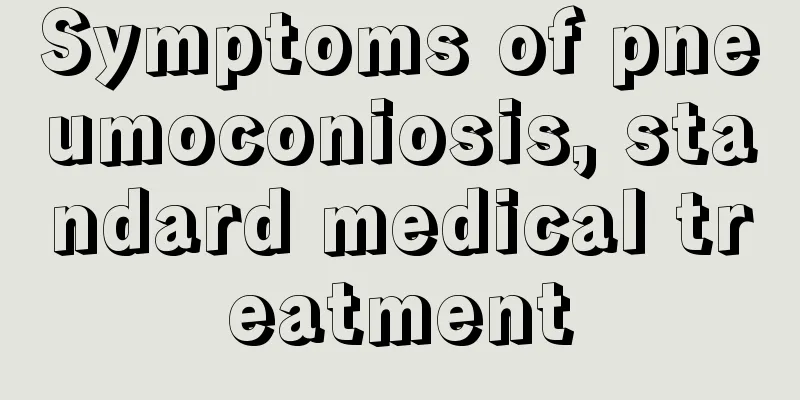Symptoms of pneumoconiosis, standard medical treatment

|
The standard name of pneumoconiosis is pneumoconiosis, which is caused by long-term inhalation of industrial dust (dust) during occupational activities. It is divided into many types, including non-accumulative pneumoconiosis, byssinia pneumoconiosis, farmers' pneumoconiosis, etc. It has no specific clinical manifestations itself, and its clinical manifestations are mostly related to complications. 1. Cough In the early stage of pneumoconiosis, the cough is usually not obvious. However, as the disease progresses, patients are often complicated with chronic bronchitis, and in the late stage, patients are often complicated with lung infection, both of which can significantly aggravate the cough. Cough is related to season, climate, etc. 2. Coughing up phlegm Coughing up phlegm is mainly caused by the respiratory system's continuous removal of dust. Generally, the amount of sputum coughed up is not much, and it is mostly gray and thin. If combined with pulmonary infection and chronic bronchitis, the amount of sputum will increase significantly, and the sputum will be yellow, sticky or lumpy and often difficult to cough up. 3. Chest pain Pneumoconiosis patients often feel chest pain, but there is usually no correlation or parallel relationship between chest pain and the clinical manifestations of pneumoconiosis. The location varies and often changes, and is mostly localized. It is usually a dull pain, but may also be a bloating or stabbing pain. 4. Difficulty breathing As the degree of lung tissue fibrosis increases, the effective breathing area decreases, the ventilation/blood flow ratio becomes unbalanced, and breathing difficulties gradually worsen. The occurrence of complications can significantly increase the severity and development speed of dyspnea. 5. Hemoptysis It is relatively rare. It may be caused by long-term chronic inflammation of the respiratory tract, resulting in mucosal vascular damage, with a small amount of blood in the sputum. It may also be caused by the dissolution and rupture of large fibrotic lesions and damage to blood vessels, resulting in increased hemoptysis. 6. Others In addition to the above-mentioned respiratory system symptoms, there may be systemic symptoms of varying degrees, the most common of which is decreased digestive function. |
<<: What to do with pneumoconiosis? Transfer from the post
>>: What causes itchy scalp? Experts answer your questions
Recommend
How can we effectively prevent liver cancer? 3 most effective ways to prevent liver cancer
The National Cancer Research Center of Japan publ...
Good walking habits can effectively prevent colorectal cancer
Although the living standard is getting higher an...
What to eat in the late stage of liver cancer? Introduction to dietary precautions in the late stage of liver cancer
What to eat is very important for patients with a...
What's the matter with my purple hair
There are different reasons for a purple tongue, ...
Where is the best place to get moxibustion for fever
People often experience symptoms of colds and fev...
How to effectively prevent liver cancer? Four things to pay attention to in preventing liver cancer
There are many patients with liver cancer, and th...
How long can a person with nasopharyngeal cancer live
How long can you live with nasopharyngeal cancer?...
It is easiest to sweat in summer, so there are some tips for washing your hair every day
1. Choose the right shampoo product When washing ...
How to effectively prevent liver cancer and reveal the early symptoms of liver cancer in men
The main group of liver cancer patients are men. ...
Dietary principles for preventing colorectal cancer
Although the cause of colorectal cancer has not y...
Surgical treatment of malignant lymphoma in different parts of the body
Malignant lymphoma can occur in the gastrointesti...
What medicine is best for treating urethritis
Women are more likely to suffer from urethritis t...
Can the smell of teeth be washed away?
Fresh breath will leave a very good impression on...
What are the benefits of eating mulberries regularly?
The so-called mulberry fruit is what we often cal...
What should liver cancer patients pay attention to during chemotherapy? How is the effect of traditional Chinese medicine treatment of liver cancer?
What should liver cancer patients pay attention t...









